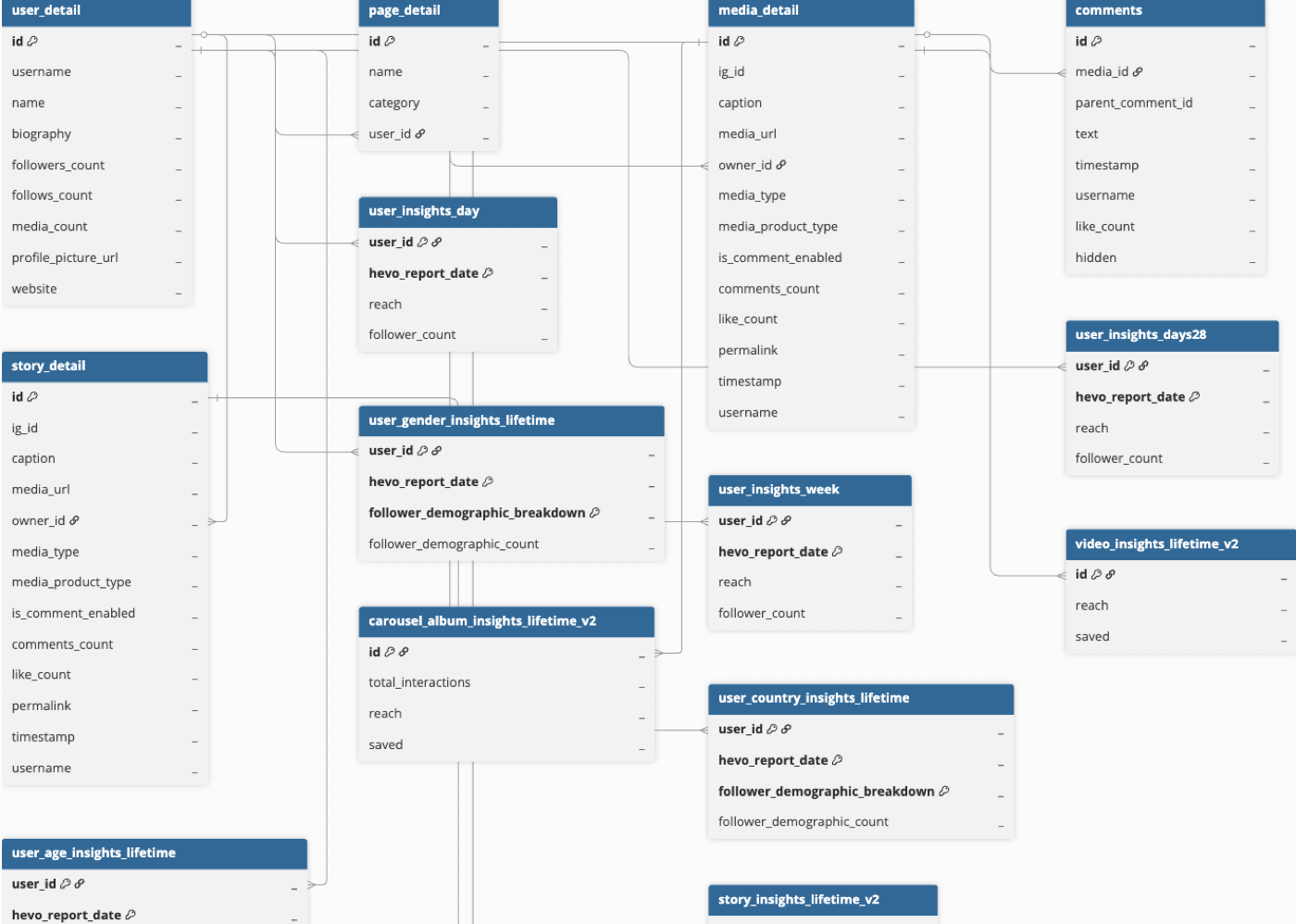- Introduction
-
Getting Started
- Creating an Account in Hevo
- Subscribing to Hevo via AWS Marketplace
- Subscribing to Hevo via Snowflake Marketplace
- Connection Options
- Familiarizing with the UI
- Creating your First Pipeline
- Data Loss Prevention and Recovery
-
Data Ingestion
- Types of Data Synchronization
- Ingestion Modes and Query Modes for Database Sources
- Ingestion and Loading Frequency
- Data Ingestion Statuses
- Deferred Data Ingestion
- Handling of Primary Keys
- Handling of Updates
- Handling of Deletes
- Hevo-generated Metadata
- Best Practices to Avoid Reaching Source API Rate Limits
-
Edge
- Getting Started
- Data Ingestion
- Core Concepts
-
Pipelines
- Familiarizing with the Pipelines UI (Edge)
- Creating an Edge Pipeline
- Working with Edge Pipelines
- Object and Schema Management
- Pipeline Job History
- Sources
- Destinations
- Alerts
- Custom Connectors
-
Releases
- Edge Release Notes - February 18, 2026
- Edge Release Notes - February 10, 2026
- Edge Release Notes - February 03, 2026
- Edge Release Notes - January 20, 2026
- Edge Release Notes - December 08, 2025
- Edge Release Notes - December 01, 2025
- Edge Release Notes - November 05, 2025
- Edge Release Notes - October 30, 2025
- Edge Release Notes - September 22, 2025
- Edge Release Notes - August 11, 2025
- Edge Release Notes - July 09, 2025
- Edge Release Notes - November 21, 2024
-
Data Loading
- Loading Data in a Database Destination
- Loading Data to a Data Warehouse
- Optimizing Data Loading for a Destination Warehouse
- Deduplicating Data in a Data Warehouse Destination
- Manually Triggering the Loading of Events
- Scheduling Data Load for a Destination
- Loading Events in Batches
- Data Loading Statuses
- Data Spike Alerts
- Name Sanitization
- Table and Column Name Compression
- Parsing Nested JSON Fields in Events
-
Pipelines
- Data Flow in a Pipeline
- Familiarizing with the Pipelines UI
- Working with Pipelines
- Managing Objects in Pipelines
- Pipeline Jobs
-
Transformations
-
Python Code-Based Transformations
- Supported Python Modules and Functions
-
Transformation Methods in the Event Class
- Create an Event
- Retrieve the Event Name
- Rename an Event
- Retrieve the Properties of an Event
- Modify the Properties for an Event
- Fetch the Primary Keys of an Event
- Modify the Primary Keys of an Event
- Fetch the Data Type of a Field
- Check if the Field is a String
- Check if the Field is a Number
- Check if the Field is Boolean
- Check if the Field is a Date
- Check if the Field is a Time Value
- Check if the Field is a Timestamp
-
TimeUtils
- Convert Date String to Required Format
- Convert Date to Required Format
- Convert Datetime String to Required Format
- Convert Epoch Time to a Date
- Convert Epoch Time to a Datetime
- Convert Epoch to Required Format
- Convert Epoch to a Time
- Get Time Difference
- Parse Date String to Date
- Parse Date String to Datetime Format
- Parse Date String to Time
- Utils
- Examples of Python Code-based Transformations
-
Drag and Drop Transformations
- Special Keywords
-
Transformation Blocks and Properties
- Add a Field
- Change Datetime Field Values
- Change Field Values
- Drop Events
- Drop Fields
- Find & Replace
- Flatten JSON
- Format Date to String
- Format Number to String
- Hash Fields
- If-Else
- Mask Fields
- Modify Text Casing
- Parse Date from String
- Parse JSON from String
- Parse Number from String
- Rename Events
- Rename Fields
- Round-off Decimal Fields
- Split Fields
- Examples of Drag and Drop Transformations
- Effect of Transformations on the Destination Table Structure
- Transformation Reference
- Transformation FAQs
-
Python Code-Based Transformations
-
Schema Mapper
- Using Schema Mapper
- Mapping Statuses
- Auto Mapping Event Types
- Manually Mapping Event Types
- Modifying Schema Mapping for Event Types
- Schema Mapper Actions
- Fixing Unmapped Fields
- Resolving Incompatible Schema Mappings
- Resizing String Columns in the Destination
- Changing the Data Type of a Destination Table Column
- Schema Mapper Compatibility Table
- Limits on the Number of Destination Columns
- File Log
- Troubleshooting Failed Events in a Pipeline
- Mismatch in Events Count in Source and Destination
- Audit Tables
- Activity Log
-
Pipeline FAQs
- Can multiple Sources connect to one Destination?
- What happens if I re-create a deleted Pipeline?
- Why is there a delay in my Pipeline?
- Can I change the Destination post-Pipeline creation?
- Why is my billable Events high with Delta Timestamp mode?
- Can I drop multiple Destination tables in a Pipeline at once?
- How does Run Now affect scheduled ingestion frequency?
- Will pausing some objects increase the ingestion speed?
- Can I see the historical load progress?
- Why is my Historical Load Progress still at 0%?
- Why is historical data not getting ingested?
- How do I set a field as a primary key?
- How do I ensure that records are loaded only once?
- Events Usage
-
Sources
- Free Sources
-
Databases and File Systems
- Data Warehouses
-
Databases
- Connecting to a Local Database
- Amazon DocumentDB
- Amazon DynamoDB
- Elasticsearch
-
MongoDB
- Generic MongoDB
- MongoDB Atlas
- Support for Multiple Data Types for the _id Field
- Example - Merge Collections Feature
-
Troubleshooting MongoDB
-
Errors During Pipeline Creation
- Error 1001 - Incorrect credentials
- Error 1005 - Connection timeout
- Error 1006 - Invalid database hostname
- Error 1007 - SSH connection failed
- Error 1008 - Database unreachable
- Error 1011 - Insufficient access
- Error 1028 - Primary/Master host needed for OpLog
- Error 1029 - Version not supported for Change Streams
- SSL 1009 - SSL Connection Failure
- Troubleshooting MongoDB Change Streams Connection
- Troubleshooting MongoDB OpLog Connection
-
Errors During Pipeline Creation
- SQL Server
-
MySQL
- Amazon Aurora MySQL
- Amazon RDS MySQL
- Azure MySQL
- Generic MySQL
- Google Cloud MySQL
- MariaDB MySQL
-
Troubleshooting MySQL
-
Errors During Pipeline Creation
- Error 1003 - Connection to host failed
- Error 1006 - Connection to host failed
- Error 1007 - SSH connection failed
- Error 1011 - Access denied
- Error 1012 - Replication access denied
- Error 1017 - Connection to host failed
- Error 1026 - Failed to connect to database
- Error 1027 - Unsupported BinLog format
- Failed to determine binlog filename/position
- Schema 'xyz' is not tracked via bin logs
- Errors Post-Pipeline Creation
-
Errors During Pipeline Creation
- MySQL FAQs
- Oracle
-
PostgreSQL
- Amazon Aurora PostgreSQL
- Amazon RDS PostgreSQL
- Azure PostgreSQL
- Generic PostgreSQL
- Google Cloud PostgreSQL
- Heroku PostgreSQL
-
Troubleshooting PostgreSQL
-
Errors during Pipeline creation
- Error 1003 - Authentication failure
- Error 1006 - Connection settings errors
- Error 1011 - Access role issue for logical replication
- Error 1012 - Access role issue for logical replication
- Error 1014 - Database does not exist
- Error 1017 - Connection settings errors
- Error 1023 - No pg_hba.conf entry
- Error 1024 - Number of requested standby connections
- Errors Post-Pipeline Creation
-
Errors during Pipeline creation
-
PostgreSQL FAQs
- Can I track updates to existing records in PostgreSQL?
- How can I migrate a Pipeline created with one PostgreSQL Source variant to another variant?
- How can I prevent data loss when migrating or upgrading my PostgreSQL database?
- Why do FLOAT4 and FLOAT8 values in PostgreSQL show additional decimal places when loaded to BigQuery?
- Why is data not being ingested from PostgreSQL Source objects?
- Troubleshooting Database Sources
- Database Source FAQs
- File Storage
- Engineering Analytics
- Finance & Accounting Analytics
-
Marketing Analytics
- ActiveCampaign
- AdRoll
- Amazon Ads
- Apple Search Ads
- AppsFlyer
- CleverTap
- Criteo
- Drip
- Facebook Ads
- Facebook Page Insights
- Firebase Analytics
- Freshsales
- Google Ads
- Google Analytics 4
- Google Analytics 360
- Google Play Console
- Google Search Console
- HubSpot
- Instagram Business
- Klaviyo v2
- Lemlist
- LinkedIn Ads
- Mailchimp
- Mailshake
- Marketo
- Microsoft Ads
- Onfleet
- Outbrain
- Pardot
- Pinterest Ads
- Pipedrive
- Recharge
- Segment
- SendGrid Webhook
- SendGrid
- Salesforce Marketing Cloud
- Snapchat Ads
- SurveyMonkey
- Taboola
- TikTok Ads
- Twitter Ads
- Typeform
- YouTube Analytics
- Product Analytics
- Sales & Support Analytics
- Source FAQs
-
Destinations
- Familiarizing with the Destinations UI
- Cloud Storage-Based
- Databases
-
Data Warehouses
- Amazon Redshift
- Amazon Redshift Serverless
- Azure Synapse Analytics
- Databricks
- Google BigQuery
- Hevo Managed Google BigQuery
- Snowflake
- Troubleshooting Data Warehouse Destinations
-
Destination FAQs
- Can I change the primary key in my Destination table?
- Can I change the Destination table name after creating the Pipeline?
- How can I change or delete the Destination table prefix?
- Why does my Destination have deleted Source records?
- How do I filter deleted Events from the Destination?
- Does a data load regenerate deleted Hevo metadata columns?
- How do I filter out specific fields before loading data?
- Transform
- Alerts
- Account Management
- Activate
- Glossary
-
Releases- Release 2.45.2 (Feb 16-23, 2026)
- Release 2.45.1 (Feb 09-16, 2026)
- Release 2.45 (Jan 12-Feb 09, 2026)
-
2025 Releases
- Release 2.44 (Dec 01, 2025-Jan 12, 2026)
- Release 2.43 (Nov 03-Dec 01, 2025)
- Release 2.42 (Oct 06-Nov 03, 2025)
- Release 2.41 (Sep 08-Oct 06, 2025)
- Release 2.40 (Aug 11-Sep 08, 2025)
- Release 2.39 (Jul 07-Aug 11, 2025)
- Release 2.38 (Jun 09-Jul 07, 2025)
- Release 2.37 (May 12-Jun 09, 2025)
- Release 2.36 (Apr 14-May 12, 2025)
- Release 2.35 (Mar 17-Apr 14, 2025)
- Release 2.34 (Feb 17-Mar 17, 2025)
- Release 2.33 (Jan 20-Feb 17, 2025)
-
2024 Releases
- Release 2.32 (Dec 16 2024-Jan 20, 2025)
- Release 2.31 (Nov 18-Dec 16, 2024)
- Release 2.30 (Oct 21-Nov 18, 2024)
- Release 2.29 (Sep 30-Oct 22, 2024)
- Release 2.28 (Sep 02-30, 2024)
- Release 2.27 (Aug 05-Sep 02, 2024)
- Release 2.26 (Jul 08-Aug 05, 2024)
- Release 2.25 (Jun 10-Jul 08, 2024)
- Release 2.24 (May 06-Jun 10, 2024)
- Release 2.23 (Apr 08-May 06, 2024)
- Release 2.22 (Mar 11-Apr 08, 2024)
- Release 2.21 (Feb 12-Mar 11, 2024)
- Release 2.20 (Jan 15-Feb 12, 2024)
-
2023 Releases
- Release 2.19 (Dec 04, 2023-Jan 15, 2024)
- Release Version 2.18
- Release Version 2.17
- Release Version 2.16 (with breaking changes)
- Release Version 2.15 (with breaking changes)
- Release Version 2.14
- Release Version 2.13
- Release Version 2.12
- Release Version 2.11
- Release Version 2.10
- Release Version 2.09
- Release Version 2.08
- Release Version 2.07
- Release Version 2.06
-
2022 Releases
- Release Version 2.05
- Release Version 2.04
- Release Version 2.03
- Release Version 2.02
- Release Version 2.01
- Release Version 2.00
- Release Version 1.99
- Release Version 1.98
- Release Version 1.97
- Release Version 1.96
- Release Version 1.95
- Release Version 1.93 & 1.94
- Release Version 1.92
- Release Version 1.91
- Release Version 1.90
- Release Version 1.89
- Release Version 1.88
- Release Version 1.87
- Release Version 1.86
- Release Version 1.84 & 1.85
- Release Version 1.83
- Release Version 1.82
- Release Version 1.81
- Release Version 1.80 (Jan-24-2022)
- Release Version 1.79 (Jan-03-2022)
-
2021 Releases
- Release Version 1.78 (Dec-20-2021)
- Release Version 1.77 (Dec-06-2021)
- Release Version 1.76 (Nov-22-2021)
- Release Version 1.75 (Nov-09-2021)
- Release Version 1.74 (Oct-25-2021)
- Release Version 1.73 (Oct-04-2021)
- Release Version 1.72 (Sep-20-2021)
- Release Version 1.71 (Sep-09-2021)
- Release Version 1.70 (Aug-23-2021)
- Release Version 1.69 (Aug-09-2021)
- Release Version 1.68 (Jul-26-2021)
- Release Version 1.67 (Jul-12-2021)
- Release Version 1.66 (Jun-28-2021)
- Release Version 1.65 (Jun-14-2021)
- Release Version 1.64 (Jun-01-2021)
- Release Version 1.63 (May-19-2021)
- Release Version 1.62 (May-05-2021)
- Release Version 1.61 (Apr-20-2021)
- Release Version 1.60 (Apr-06-2021)
- Release Version 1.59 (Mar-23-2021)
- Release Version 1.58 (Mar-09-2021)
- Release Version 1.57 (Feb-22-2021)
- Release Version 1.56 (Feb-09-2021)
- Release Version 1.55 (Jan-25-2021)
- Release Version 1.54 (Jan-12-2021)
-
2020 Releases
- Release Version 1.53 (Dec-22-2020)
- Release Version 1.52 (Dec-03-2020)
- Release Version 1.51 (Nov-10-2020)
- Release Version 1.50 (Oct-19-2020)
- Release Version 1.49 (Sep-28-2020)
- Release Version 1.48 (Sep-01-2020)
- Release Version 1.47 (Aug-06-2020)
- Release Version 1.46 (Jul-21-2020)
- Release Version 1.45 (Jul-02-2020)
- Release Version 1.44 (Jun-11-2020)
- Release Version 1.43 (May-15-2020)
- Release Version 1.42 (Apr-30-2020)
- Release Version 1.41 (Apr-2020)
- Release Version 1.40 (Mar-2020)
- Release Version 1.39 (Feb-2020)
- Release Version 1.38 (Jan-2020)
- Early Access New
Instagram Business
From Release 2.39.3, Hevo uses v23.0 of the Marketing API to fetch data from Instagram Business. The upgrade process was seamless, with no downtime for your Pipelines. However, you may need to reauthorize Hevo for existing Pipelines. Refer to section, Add an Instagram Business account and authorize Hevo for the authorization steps.
This change applies to all new and existing Pipelines created with this Source.
Instagram Business is used by both content creators and businesses to publish posts and stories. You need an Instagram Business account to get insights into how these posts, stories, and your account are performing.
Instagram is managed by Facebook. Therefore, each of your Instagram Business accounts must be linked to a Facebook page. However, one Facebook account may be linked to up to five Instagram Business accounts. To fetch your Instagram data, Hevo uses your Facebook login credentials to authenticate the respective Instagram Business account.
You can create Pipelines in Hevo that read your data using the Facebook Marketing API and load it to a Destination system of your choice.
Prerequisites
-
An active Facebook account and Facebook page.
-
The Instagram Business account is linked to a Facebook page.
-
Instagram currently supports linking an Instagram Business account to a Facebook page only via the mobile app.
-
Your personal Facebook account must have an
adminrole on the Facebook Page you are connecting to. -
You are assigned the Team Administrator, Team Collaborator, or Pipeline Administrator role in Hevo to create the Pipeline.
Creating an Instagram Business account
You can convert your personal Instagram profile to a business account to access the features that enable you to grow your business.
NOTE: Skip this section if you already have an Instagram Business account.
Perform the following steps to switch your profile to a business account:
-
Log in to your Instagram profile in your mobile.
-
Click the hamburger menu in the upper right corner.
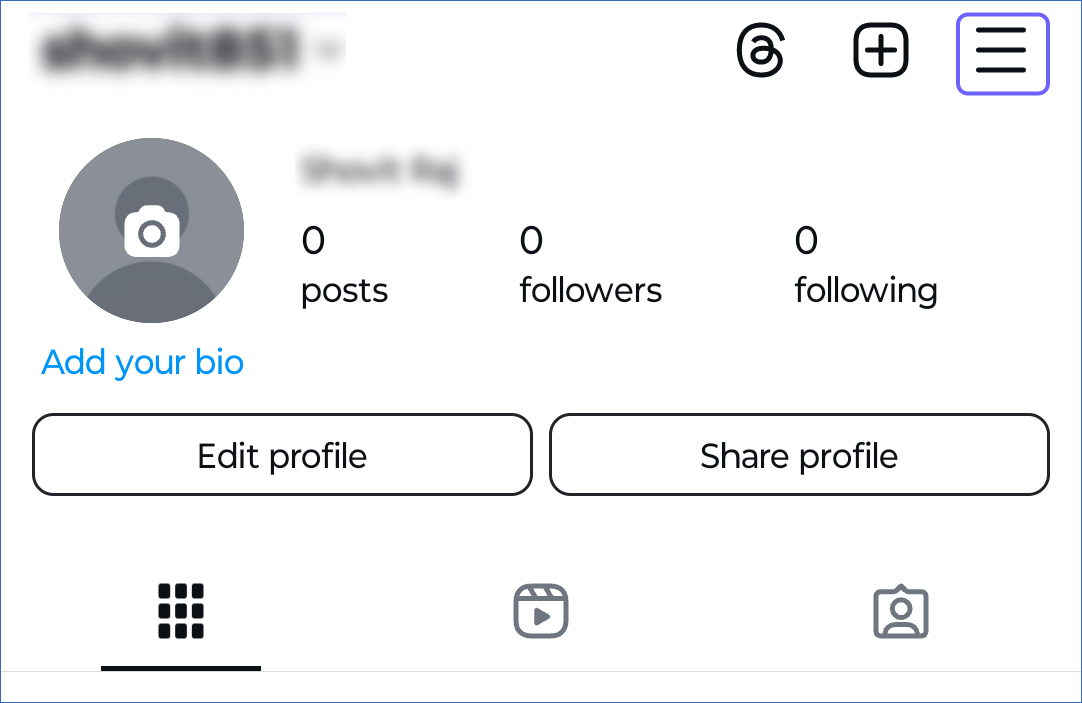
-
Scroll down to the For professionals section and select Account type and tools.
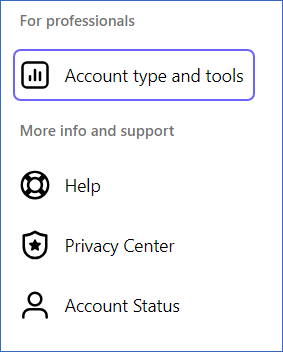
-
Under Account type, click Switch to professional account.
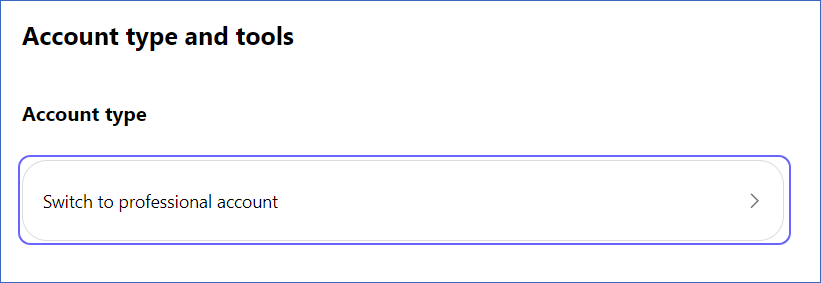
-
Click Next.
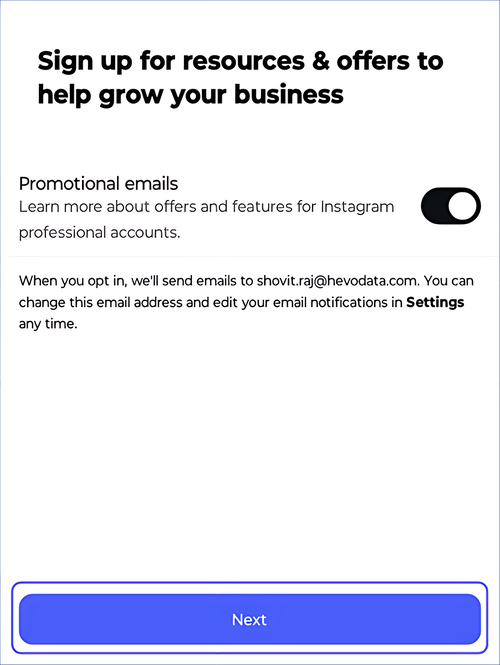
-
Select your business category and then click Switch to professional account.
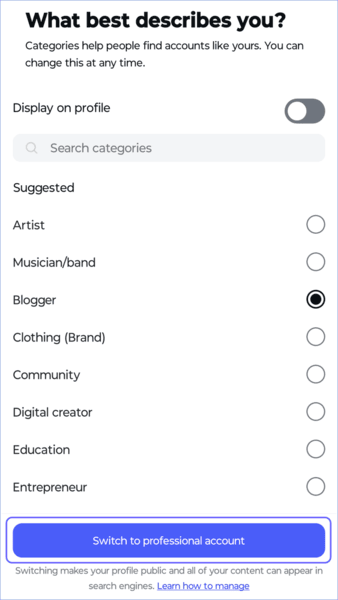
-
Select Business, and then click Next.
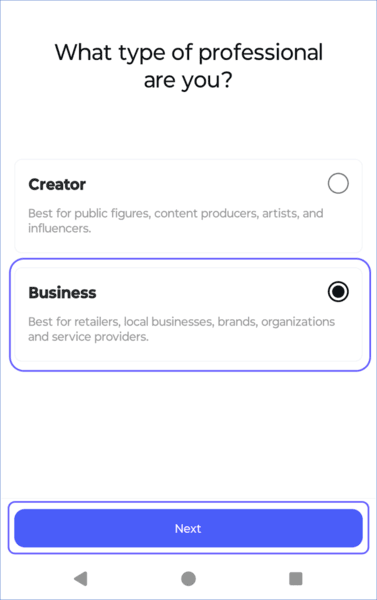
-
Click Next.

-
In the Review your contact info screen, add your business details, such as your business address and contact information, and then click Next.

You have now successfully switched your Instagram profile to a business account.
Linking a Facebook Page to your Instagram Business account
You must link a Facebook page to the Instagram Business account as Hevo uses a Facebook login to authenticate your Instagram Business account.
To do this:
-
Log in to your Instagram profile using your mobile.
-
Click Edit profile.
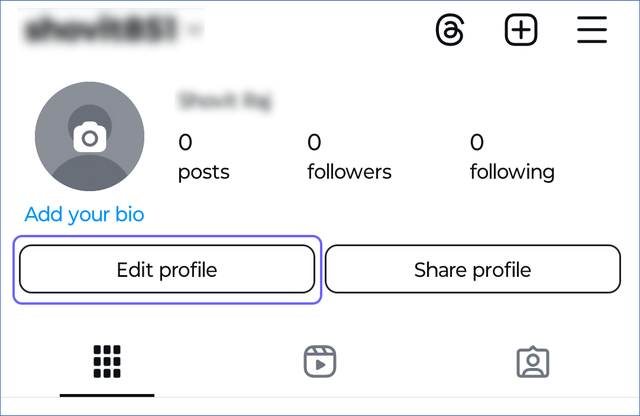
-
Under Public business information, click Page.
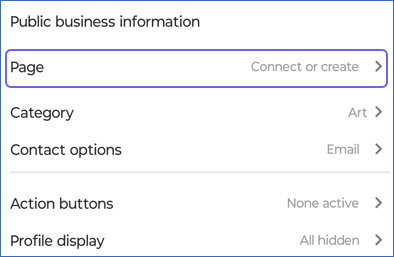
-
In the pop-up dialog, click Continue.
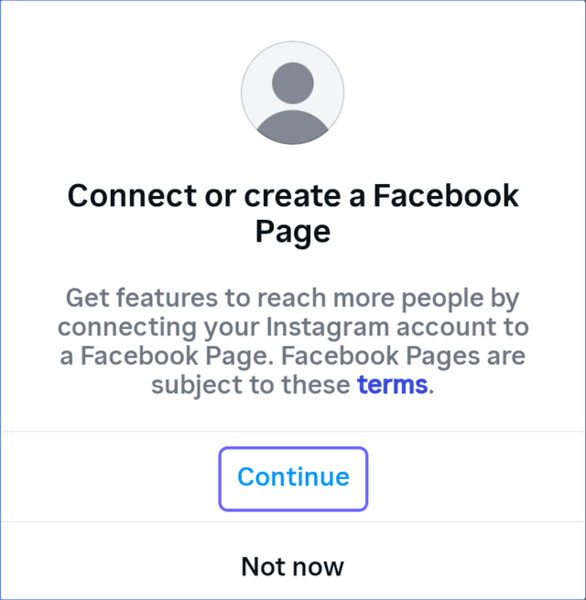
-
Click Log in to Facebook.

-
In the Connect your Facebook Page screen, do one of the following:
-
Select a page from the list of pages that you want to connect to.
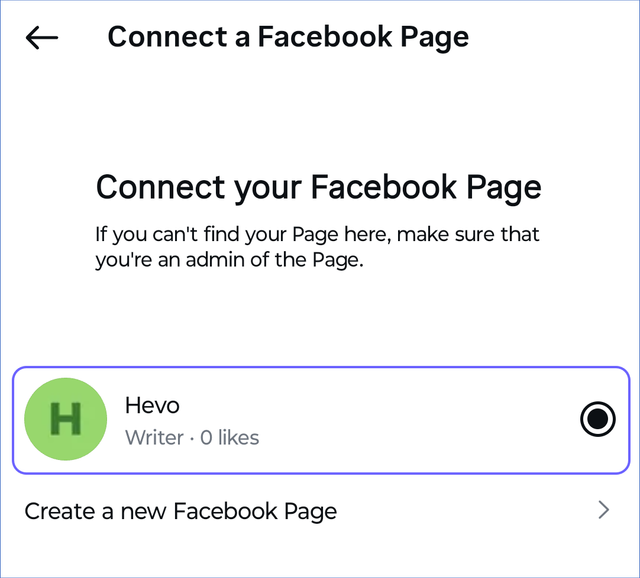
-
If you want to create a new page, click Create a new Facebook Page and perform the following steps:

-
Specify a unique Page name.
-
Click Page category and select the category for your Facebook page.
-
Click Create.
-
-
-
Click Connect.
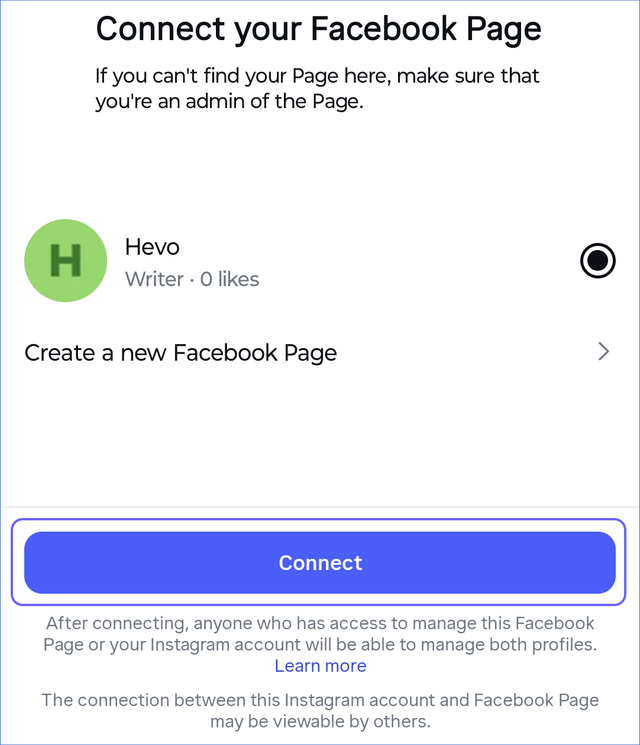
Configuring Instagram Business as a Source
Perform the following steps to configure Instagram Business as a Source in Hevo:
Step 1. Add an Instagram Business account and authorize Hevo
-
Click PIPELINES in the Navigation Bar.
-
Click + Create Pipeline in the Pipelines List View.
-
On the Select Source Type page, select Instagram Business.
-
On the Select Destination Type page, select the type of Destination you want to use.
-
On the Configure your Instagram Business account page, do one of the following:
-
Select a previously configured account and click Continue.
-
Click + Add Instagram Business Account and perform the following steps to configure an account:

-
Log in to Instagram using the Facebook account linked to your Instagram Business account(s), and click Continue as <Company Name> in the pop-up dialog. Hevo uses your Facebook login to connect to the linked Instagram Business account.
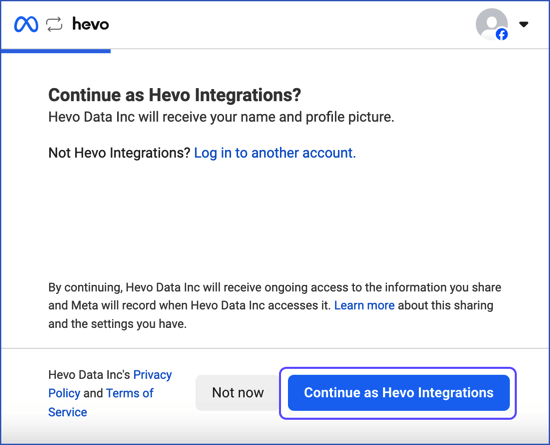
-
Select one of the following options:
-
Opt in to all current and future business (Default): Hevo gets access to all the existing businesses in your Business Manager account(s) and the ones you create in the future.
-
Opt in to current businesses only: Hevo gets access only to the businesses in the Business Manager account(s) you select. You can select the accounts individually or click the Select all option to grant access to all the accounts.
Note: As part of the Facebook Marketing API update to v18.0, Hevo requires business management permission to replicate data from your Instagram Business account(s).
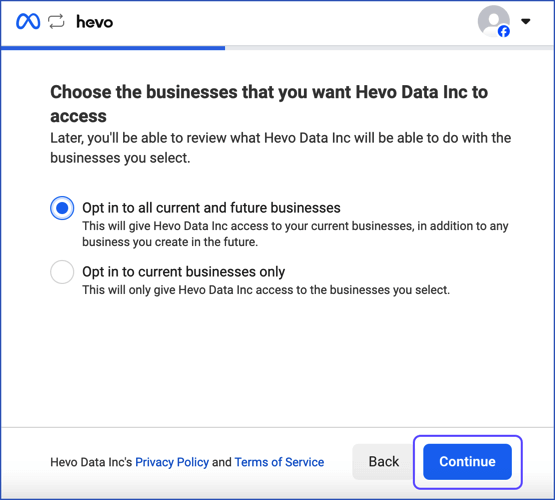
-
-
Click Continue.
-
Select one of the following to choose the Facebook page(s) associated with the Business Manager account(s) selected in the previous step:
-
Opt in to all current and future Pages (Default): Hevo gets access to all the existing pages in the account and the ones you create in the future.
-
Opt in to current Pages only: Hevo gets access only to the pages you select. You can select the page(s) individually or click the Select all option to grant access to all the pages.
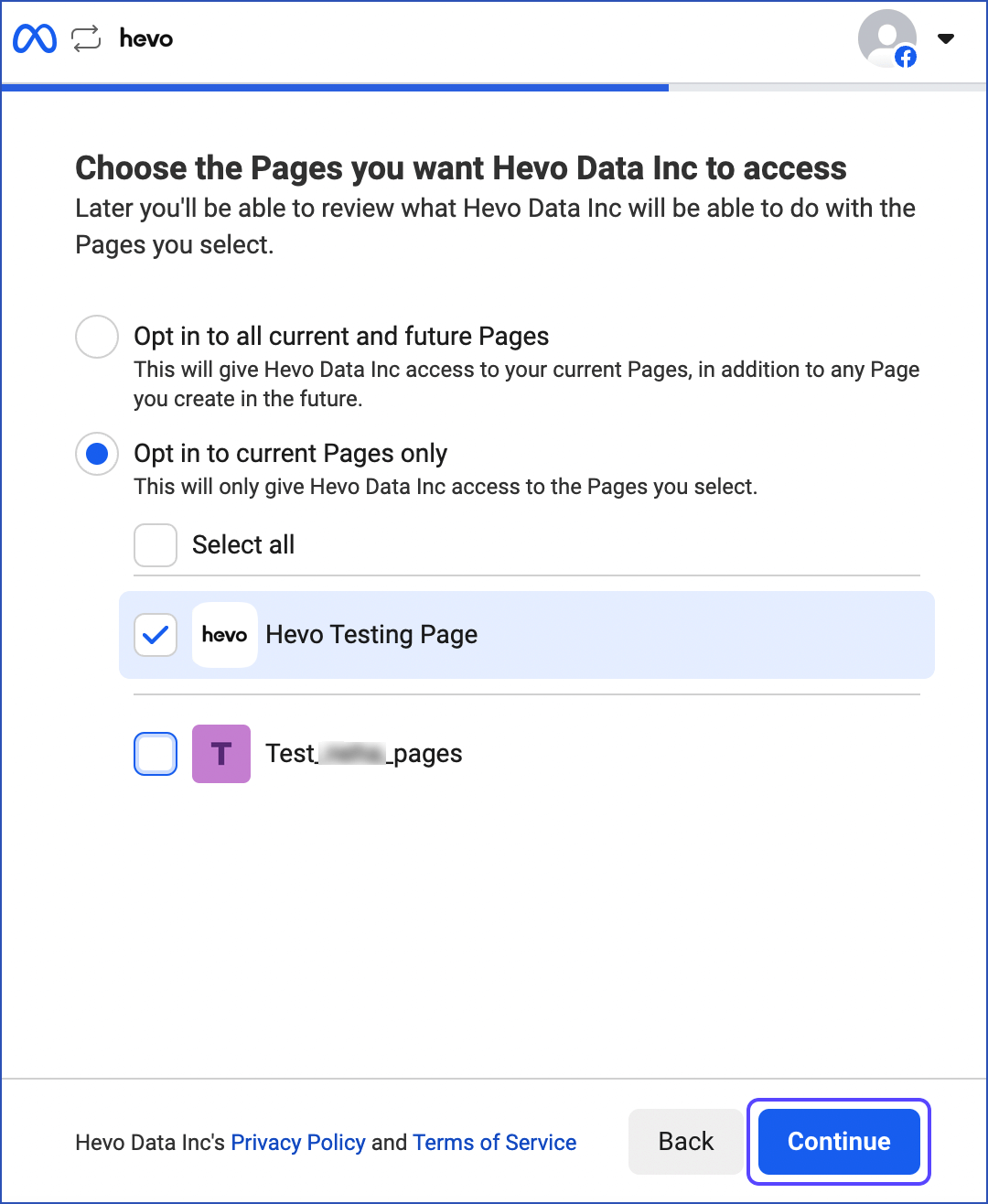
-
-
Click Continue.
-
Select one of the following to choose the Instagram Business account(s) from which you want to replicate data:
-
Opt in to all current and future Instagram accounts (Default): Hevo gets access to all your existing Instagram Business account(s) and the ones you create in the future.
-
Opt in to current Instagram accounts only: Hevo gets access only to the Instagram Business account(s) you select. You can select the accounts individually or click the Select all option to grant access to all the accounts.
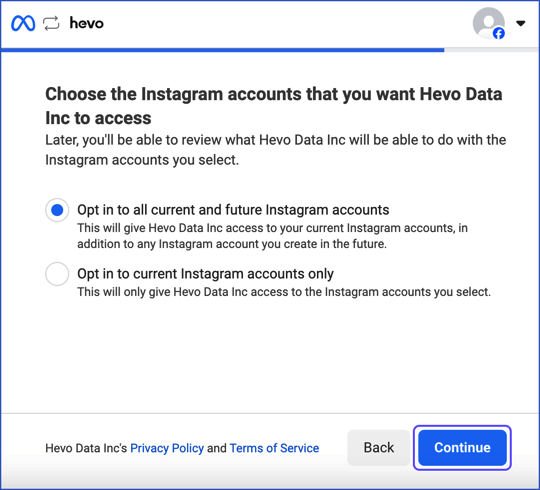
-
-
Click Continue.
-
Review the permissions requested by Hevo and click Save to authorize Hevo to access the data.
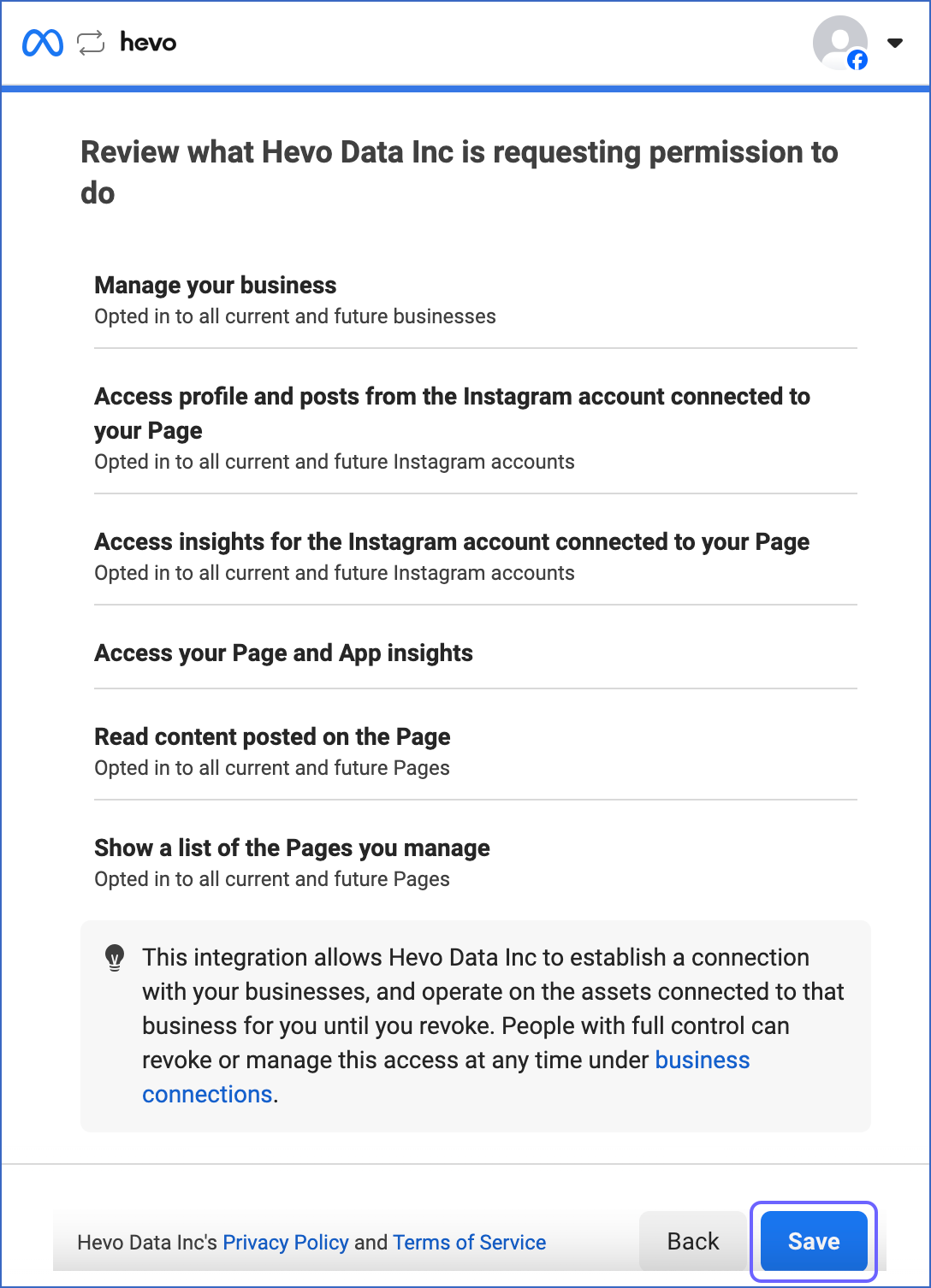
-
Click Got it in the confirmation dialog.
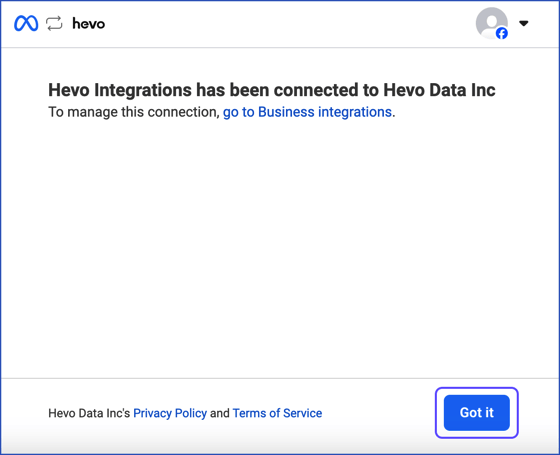
The Instagram Business account is successfully added in Hevo.
-
-
Step 2. Configure the Instagram Business Source settings
-
On the Configure your Instagram Business Source page, specify the following:

-
Pipeline Name: A unique name for the Pipeline, not exceeding 255 characters.
-
Instagram Business account: Select the Instagram Business accounts. Default: All.
Note: Only the Instagram Business accounts for which you have selected the linked Facebook pages are available for selection.
-
Historical Sync Duration: The duration for which you want to ingest the existing data from the Source. Default duration: 1 Year.
-
-
Click Test & Continue.
-
Proceed to configuring the data ingestion and setting up the Destination.
Data Replication
| For Teams Created | Default Ingestion Frequency | Minimum Ingestion Frequency | Maximum Ingestion Frequency | Custom Frequency Range (in Hrs) |
|---|---|---|---|---|
| Before Release 2.21 | 24 Hrs | 15 Mins | 24 Hrs | 1-24 |
| After Release 2.21 | 6 Hrs | 30 Mins | 24 Hrs | 1-24 |
Note: The custom frequency must be set in hours as an integer value. For example, 1, 2, or 3, but not 1.5 or 1.75.
-
Historical Data: The first run of the Pipeline ingests historical data for the selected objects on the basis of the historical sync duration specified at the time of creating the Pipeline and loads it to the Destination. Default duration: 1 Year.
-
Incremental Data: Once the historical data ingestion is complete, every subsequent run of the Pipeline fetches new and updated data for the following objects:
-
user_insights_rolling_day -
user_insights_rolling_week -
user_insights_rolling_days28 -
media_comment_insights. This is available from Release 1.78. For existing Pipelines, Full Load for this object will be stopped and incremental data ingestion be started instead.
The default ingestion frequency is 24 hours.
-
-
The object
media-comment-insightscorresponds to the following Event Types in the Schema Mapper:-
media_detail -
comment -
video_insights_lifetime_v2 -
carousel_album_insights_lifetime_v2 -
image_insights_lifetime_v2
-
Note: From Release 1.86, Hevo ingests only new and updated data for Full Load objects to optimize the quota consumption. This feature is currently available on request only. You need to contact Hevo Support to enable it for your team.
Schema and Primary Keys
The date field represents the dates in which data was generated in Instagram. However, for the object user_insights_rolling_week, it represents the last date of the 7-day duration for which the data is aggregated. For example, if the date is 31/03/2021, then the object user_insights_rolling_week contains the aggregated data for the duration 25/03/3021 to 31/03/2021.
Hevo uses the following schema to upload the records in the Destination. For a detailed view of the objects, fields, and relationships, click the ERD.
Data Model
The following tables (objects) are created in the Destination when you run the Pipeline:
| Objects | Description |
|---|---|
| user_detail | Contains details about the Instagram Business account. |
| page_detail | Contains details about the Facebook page linked to the Instagram Business account. |
| story_detail | Contains details about the stories posted on the Instagram Business account. |
| user_age_insights_lifetime_v2 | Contains insights about the age distribution of followers, aggregated over a lifetime based on available demographic data. |
| user_gender_insights_lifetime_v2 | Contains insights about the gender distribution of followers, aggregated over a lifetime based on available demographic data. |
| user_country_insights_lifetime_v2 | Contains insights about the country distribution of followers, aggregated over a lifetime based on available demographic data. |
| user_insights_rolling_day | Contains aggregated insights of the account for the last two days. |
| user_insights_rolling_week | Contains aggregated insights of the account for the last seven days. |
| user_insights_rolling_days28 | Contains aggregated insights of the account for the last 28 days. |
| media_detail | Contains details about the type of media content posted from your account. |
| video_insights_lifetime_v2 | Contains aggregated insights for the videos posted from your account over a lifetime. |
| carousel_album_insights_lifetime_v2 | Contains aggregated insights for the carousel albums posted from your account over a lifetime. |
| image_insights_lifetime_v2 | Contains aggregated insights for the images posted from your account over a lifetime. |
| story_insights_lifetime_v2 | Contains aggregated insights for the stories posted from your account over a lifetime. |
| comment | Contains details of all the comments posted on the media posts of the account. |
Additional Information
Read the detailed Hevo documentation for the following related topics:
Source Considerations
-
Instagram allows you to fetch data of up to two years from the current date.
-
Instagram allows you to create a business account and link it to Facebook only via the mobile app.
-
Instagram Business aggregates the
follower_countmetric over a rolling window of the last 30 days. It does not capture any data updates made outside of this window. -
Hevo fetches only the latest 10,000 media entities each time the media_detail object is ingested due to the constraints imposed by Instagram.
Limitations
-
Hevo currently does not support the Hashtags object.
-
Hevo does not load data from a column into the Destination table if its size exceeds 16 MB, and skips the Event if it exceeds 40 MB. If the Event contains a column larger than 16 MB, Hevo attempts to load the Event after dropping that column’s data. However, if the Event size still exceeds 40 MB, then the Event is also dropped. As a result, you may see discrepancies between your Source and Destination data. To avoid such a scenario, ensure that each Event contains less than 40 MB of data.
Revision History
Refer to the following table for the list of key updates made to this page:
| Date | Release | Description of Change |
|---|---|---|
| Nov-07-2025 | NA | Updated the document as per the latest Hevo UI. |
| Sep-18-2025 | NA | Updated section, Configuring Instagram Business as a Source as per the latest UI. |
| Sep-01-2025 | 2.39.3 | Updated the warning container in the overview section to inform about the upgrade to Marketing API v23.0. |
| Jul-15-2025 | NA | Updated the Creating an Instagram Business account section as per the latest Instagram Business UI. |
| Jul-07-2025 | NA | Updated the Limitations section to inform about the max record and column size in an Event. |
| Jan-07-2025 | NA | Updated the Limitations section to add information on Event size. |
| Jan-06-2025 | 2.31.2 | Updated the page overview to: - Add a warning container with information about the upgrade to Marketing API v21.0, - Remove note about the upgrade to Marketing API v19.0. Removed the limitation on data ingestion for the video_insights_lifetime_v2 object from the Limitations and Data Model section. |
| Dec-16-2024 | NA | Updated sections, Limitations and Data Model to add a limitation on data ingestion for the video_insights_lifetime_v2 object. |
| Nov-05-2024 | NA | Updated section, Creating an Instagram Business account as per the latest Instagram Business UI. |
| Jul-01-2024 | 2.25 | Updated the page overview to: - Remove the warning container about upgrade to Marketing API v18.0, - Add a note about the upgrade to Marketing API v19.0. |
| Mar-05-2024 | 2.21 | Updated the ingestion frequency table in the Data Replication section. |
| Jan-29-2024 | 2.19.3 | - Added a warning container at the top of the page to mention the Marketing API v18.0 update. - Updated sections, Data Model, Schema and Primary Keys, and Data Replication to add information about changes to the Instagram ERD with the Marketing API v18.0 update. |
| Oct-17-2022 | NA | Updated the section, Source Considerations to include information about the rolling window imposed by Instagram on the ingestion of the follower_count metric. |
| Jul-27-2022 | NA | Updated Note in section, Data Replication. |
| Apr-11-2022 | 1.86 | Added a note in section, Data Replication to inform about optimized quota consumption for Full Load objects. |
| Dec-20-2021 | 1.78 | Added media_comment_insights to the list of objects under Data Replication, Incremental Data section. |
| Oct-25-2021 | NA | Added the Pipeline frequency information in the Data Replication section. |
| Sep-20-2021 | 1.72 | - Replaced media with media_detail in the Data Replication and Data Model sections. - Updated the section, Source Considerations to include information about the constraints imposed by Instagram on the ingestion of the media_detail object. |
| Jul-26-2021 | NA | Added a note in the Overview section about Hevo providing a fully-managed Google BigQuery Destination for Pipelines created with this Source. |
| Apr-06-2021 | 1.60 | New document |
